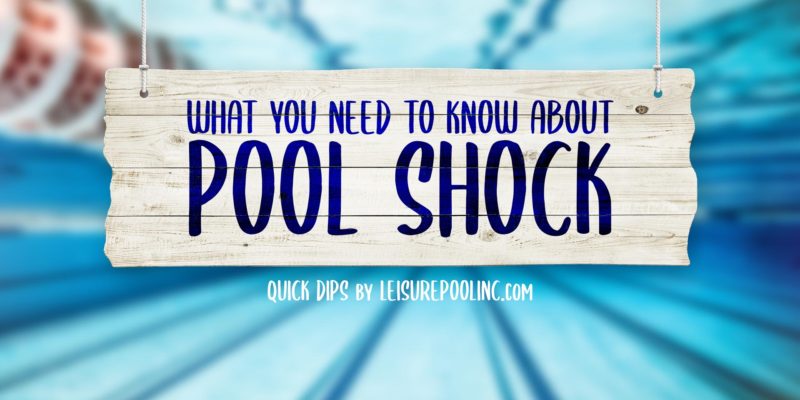Quick Dip: Pool Shock – What you Need to Know
THE DIFFERENCES BETWEEN POOL SHOCKS & MORE – SHOCK 101
Liquid chlorine, lithium hypochlorite, calcium hypochlorite – all of these have one thing in common, they are all considered to be pool shocks. Shocking your pool water is one of the keys to proper pool water quality maintenance. Failing to shock your pool water can lead to algae and bacteria build-up. This creates a swimming pool that is not only uninviting, but hazardous to pool patrons as well. Just because your water is clear, does not mean it is safe to swim in. This article covers a few of the most common types of shock, the difference between a shock and an oxidizer and chlorine vs. bromine. Read on for more!
Common Types of Pool/Spa Shock
Sodium Hypochlorite – Liquid Pool Shock
Sodium hypochlorite solution aka liquid chlorine is probably the most common choice amongst pool operators for use as a pool shock. Liquid shock contains no chlorine stabilizer (cyanuric acid) and thus is useful for use in commercial indoor pools and/or when cyanuric acid levels are high. Sodium hypochlorite comes in varying concentrations (we sell it at a commercial-grade 12.5 – 15% strength) and can be purchased in sizes ranging from 1-gallon jugs to full-on rail cars.
Calcium Hypochlorite – Cal-Hypo
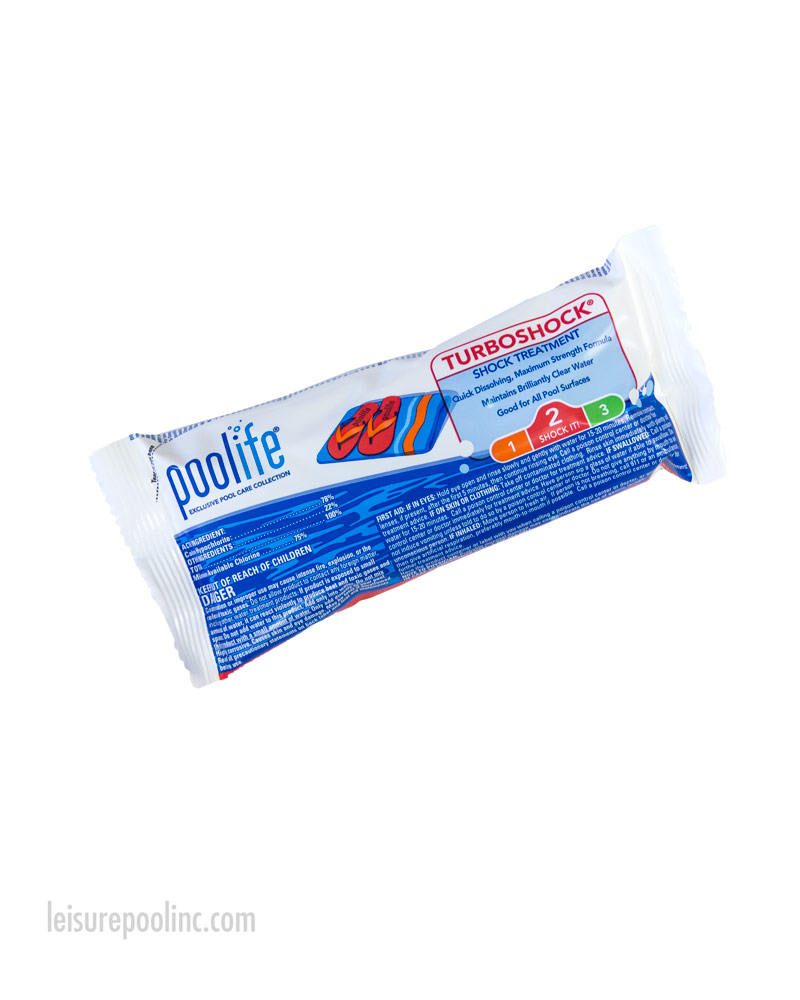
Calcium hypochlorite contains a high amount of available chlorine and is available in varying concentrations. Cal-hypo contains no chlorine stabilizer (cyanuric acid) and thus is useful for use in commercial indoor pools and/or when cyanuric acid levels are high. As it can bleach vinyl pool liners, we recommend caution if you are attempting to use this product in vinyl pools.
Calcium hypochlorite, as the name suggests, contains calcium and will increase the calcium hardness levels of your pool water. Examples of Cal-hypo products include Arch Poolife TurboShock, the product we recommend as the replacement for the now-discontinued Breakout 35, lithium hypochlorite.
Trichlor & Dichlor – Stabilized Products
Trichlor products are most often seen in stick or tablet/puck form while Dichlor is available in granules. The tablets are fed into the pool water via floaters or automatic erosion feeder systems. Granules are broadcasted over the pool water or pre-dissolved prior to insertion. (Consult your product’s manual or directions on the packaging) Both of these products contain cyanuric acid chlorine stabilizer making them preferred for many outdoor pools. With a high available chlorine level, trichlor and dichlor products are often used in commercial settings.
Lithium Hypochlorite – A Discontinued Product
Lithium Hypochlorite was a favorite of many of our clients. This product was fast to dissolve, safe for vinyl pools and had very little to no wait time between application and a ready to swim pool status. Unfortunately, this product is no longer being produced for swimming pool use. This is due to limited lithium supplies being used in the production of lithium-ion batteries. We recommend the use of Cal-hypo in most situations as a replacement for lithium pool shock.
Shock vs. Oxidizer – What’s the Difference?
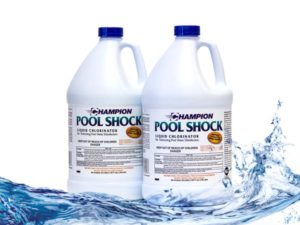
Shock is any kind of product (liquid chlorine, bromine concentrate or granular shocks are just a few examples) used to increase the available free chlorine level of your pool or spa water to a highly concentrated level.
Shock attacks the bacteria and organics in your water. Organics can come from dead skin cells, waste, sweat or any other material brought into your water by swimmers. This creates a feeding ground for bacteria and can cause algae to form. This is why we recommend regularly shocking your pool.
In regards to waste, a straight Oxidizer works the same as a traditional sanitation shock and works to break down the organics in your water through oxidation. The difference between a straight oxidizer and a shock/oxidizer is that there is no chlorine in a straight oxidizer. Using an oxidizer in conjunction with shock allows you to use less chlorine since the shock that you are adding is being aided in the oxidation of waste by the straight oxidizer.
This difference is an important one to note. We have often had clients use a straight oxidizer, not realizing they are not adding any chlorine sanitizer to their pool water. Remember, a straight oxidizer does not contain chlorine, that is what sanitizers and shock products are used for.
Bromine vs. Chlorine
Another question we run into a lot here at Leisure Pool & Spa Supply is what is the difference between bromine and chlorine?
Chlorine – Chlorine is the most common type of sanitizer used in swimming pools. Many products contain available chlorine. From sodium hypochlorite solutions (liquid chlorine) to tablets, to granular calcium hypochlorite, chlorine products are seen everywhere. When used in outdoor pools, chlorine can be used with cyanuric acid stabilizers which act as a sunscreen against the sun’s UV rays – increasing its life expectancy in outdoor scenarios. Due to its ubiquity, chlorine is cheaper than Bromine in most situations.
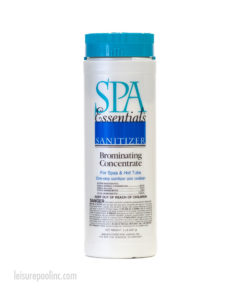 Bromine – Bromine works the same as chlorine when it comes to its basic function as a sanitizer. Bromine offers a few benefits that make it a good choice in certain scenarios. Bromine is more effective in high-temperature situations. This means that Bromine, even though more expensive, can actually be the same cost or more affordable when used in hot tubs.
Bromine – Bromine works the same as chlorine when it comes to its basic function as a sanitizer. Bromine offers a few benefits that make it a good choice in certain scenarios. Bromine is more effective in high-temperature situations. This means that Bromine, even though more expensive, can actually be the same cost or more affordable when used in hot tubs.
In hot tubs, less product is needed to get the same sanitation results, making bromine a good choice for those with sensitive skin. Bromine produces less odor as well, perfect for hot tub use. Bromine cannot be stabilized with cyanuric acid meaning that in sunny situations, the product will bake-off very quickly. Want to learn more about pool and spa operation? Click here to read more Quick Dips!
Have a Pool or Spa Question?
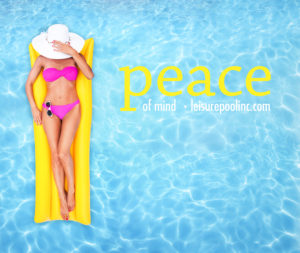
Leisure Pool & Spa Supply, Inc. was founded in 1982 and is headquartered in Syracuse, Indiana. We focus on serving the service and supply needs of both residential and commercial clients. We have grown to include a branch office in Indianapolis allowing us to work with clients across the State of Indiana. Our service technicians are highly experienced and have combined decades of experience in the aquatics industry.
If you have any questions regarding your pool or aquatic center needs, do not hesitate to get in touch with us. We are always available via phone or email and look forward to assisting you. If you are looking to purchase products directly online, visit our online pool and spa supply store.
Leisure Pool & Spa Supply – Pool & Spa Service & Expertise Since 1982

